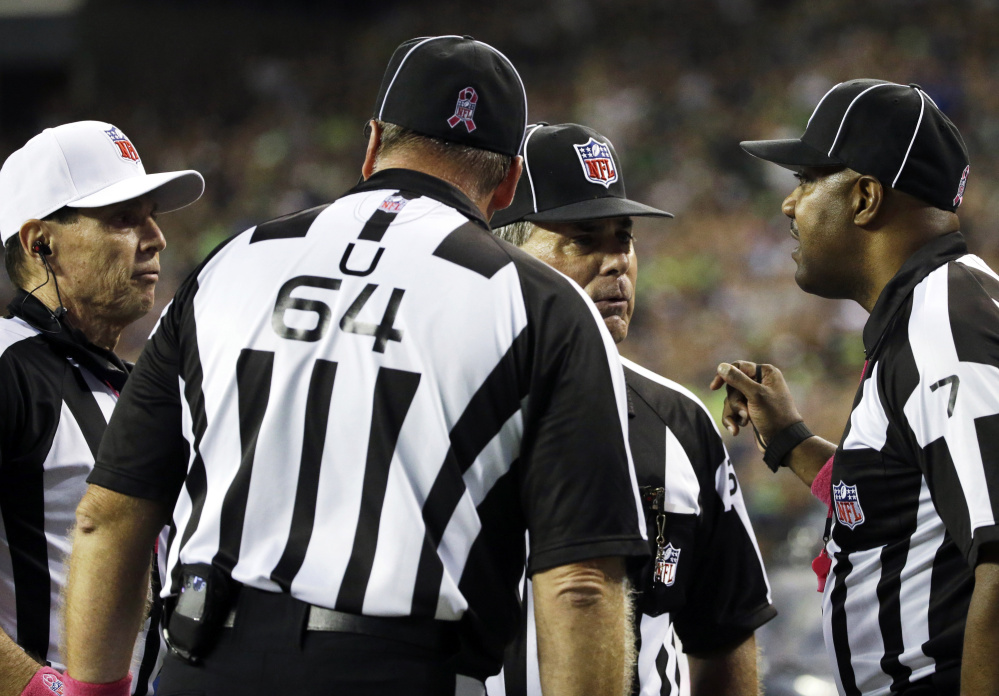If it felt like there were lots of officiating gaffes during this NFL season, that’s because there were. Enough to prompt Commissioner Roger Goodell to pledge that “no stone will be left unturned” to improve the way games are called.
All of the accumulated mistakes reached a tipping point, so much so that referees will be able to consult with league VP of Officiating Dean Blandino during playoff games.
Who knows what other changes could be in store moving forward? Everyone, it seems, has a theory about how the NFL can cut down on the number of times per game that players, coaches and fans throw their hands in the air and wonder how an “obvious” rule violation could be ignored. Or how the clock could keep running when it shouldn’t. Or how a team could be penalized when it did nothing wrong.
“There’s a lot of room for improvement,” Washington defensive lineman Ricky Jean Francois said. “The officials don’t seem to understand that the calls they’re making are affecting games and can affect playoff spots.”
He presented a couple changes he’d like to see:
• Give Goodell the power to fine or suspend officials who make glaring mistakes.
• Switch around the crews, so they’re different from week to week, something Goodell himself has spoken about.
“I would love that. Most of these crews have been in the league longer than I’ve been alive. Break these crews apart and start mixing or mingling them. For 17 weeks, change them. In the playoffs? Change them. Don’t let them be together,” Jean Francois said. “It’s human nature. If you’ve been together forever, and one of you misses something, they might cover for each other. But if they don’t know each other, they’re not as comfortable with each other, and they won’t cover for each other.”
In an essay for Sports Illustrated’s Monday Morning Quarterback, Seattle Seahawks cornerback Richard Sherman offered four suggestions of his own:
• Simplify the rulebook;
• Add an eighth official;
• Change the officials’ positions on the field;
• Improve player-official communication.
The quality of officiating can be in the eye of the beholder, of course.
“What I think is a bad call is probably because the call is on us,” Washington Pro Bowl left tackle Trent Williams said with a knowing laugh. “And what I think is a good call is probably because the call is on (an opponent). It’s extremely tough on those guys. The game moves extremely fast.”
Still, coaches and players alike have not been shy this season about expressing disbelief at certain calls – or non-calls.
Among the most memorable was the failure to notice a Seattle player illegally batting a football out of the end zone on purpose in a victory over Detroit.
And the valuable seconds frittered away by the clock operator during a game between Pittsburgh and San Diego.
How about no ejection of Giants receiver Odell Beckham Jr., despite his helmet-to-helmet launch at Carolina cornerback Josh Norman, part of a trio of personal fouls?
On the other hand, as pointed out by Mike Pereira, Blandino’s predecessor as head of NFL officiating and now a Fox analyst, we might think there are more miscues because we hear about all of them.
“Social media has made it so much more difficult right now, because everyone is tracking everything,” Pereira said. “All one person needs to do is see it and put it on social media and then the world finds out about it.”
Send questions/comments to the editors.



Success. Please wait for the page to reload. If the page does not reload within 5 seconds, please refresh the page.
Enter your email and password to access comments.
Hi, to comment on stories you must . This profile is in addition to your subscription and website login.
Already have a commenting profile? .
Invalid username/password.
Please check your email to confirm and complete your registration.
Only subscribers are eligible to post comments. Please subscribe or login first for digital access. Here’s why.
Use the form below to reset your password. When you've submitted your account email, we will send an email with a reset code.